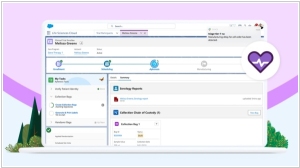Salesforce vs Sprinklr
August 20, 2023 | Author: Sandeep Sharma
75

Most-popular CRM. Easy collaboration. Proven cloud platform. Salesforce.com offers everything you need to transform your business into a Social Enterprise, so you can connect to customers and employees like never before. With no software or hardware to install, you're up and running—and seeing a positive impact on your business—quickly.
18

Sprinklr offers the only Social Media Management System that enables global scale for the social enterprise with social media analytics. Increase profits, reduce costs, and boost efficiency by bringing the voice of your customer deep into your enterprise. Make social an integral part of your business from marketing and customer service, to sales and beyond. Purpose-built for large enterprises to ensure the voice of the customer is heard and acted upon by every employee
Salesforce and Sprinklr are both leading customer relationship management (CRM) platforms, but they have distinct focuses and functionalities. Salesforce is a comprehensive CRM solution that offers a wide range of tools and features for sales, marketing, and customer service. It enables businesses to manage their customer data, track sales activities, automate marketing campaigns, and provide personalized customer experiences. Salesforce has a vast ecosystem of integrations and a strong emphasis on scalability and customization. On the other hand, Sprinklr is a social media management and customer experience platform that focuses on managing and analyzing social media interactions and customer feedback. It provides tools for social media listening, engagement, content publishing, and analytics across various social channels. Sprinklr specializes in helping businesses optimize their social media presence and deliver consistent brand experiences.
See also: Top 10 Social Media Management tools
See also: Top 10 Social Media Management tools
Salesforce vs Sprinklr in our news:
2023. Salesforce to acquire Airkit.ai, a low-code platform for building AI customer service agents
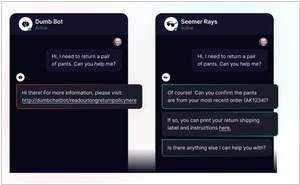
Salesforce is set to acquire Airkit.ai, a low-code platform designed to assist e-commerce enterprises in constructing AI-driven customer service agents. Initially conceived as a self-serve customer engagement platform, Airkit facilitated the integration of data silos and addressed various use cases like user onboarding. However, in a recent rebranding move, the company transformed into Airkit.ai and unveiled its inaugural integrated product, a GPT-4-powered platform enabling businesses like OpenTable and ShipBob to develop customized customer service chatbots capable of handling inquiries related to order status, refunds, product information, and more.
2023. Salesforce launches AI Cloud to bring models to the enterprise
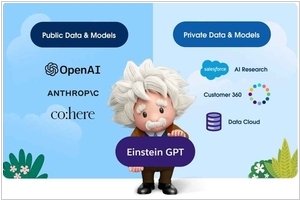
Salesforce is introducing a new collection of products with the goal of strengthening its position in the highly competitive field of AI. This suite, known as AI Cloud, consists of tools that are designed to provide AI solutions that are suitable for enterprise use. It represents Salesforce's latest effort to enhance its product lineup with AI capabilities across different disciplines. The launch of AI Cloud builds upon the company's previous generative AI initiative, which was introduced in March, aiming to incorporate generative AI throughout the entire Salesforce platform. AI Cloud serves as a hosting and delivery platform for AI models, specifically those focused on generating text, from a variety of partners such as Amazon Web Services, Anthropic, Cohere, and OpenAI. Additionally, Salesforce's own AI research division offers first-party models that power features like code generation and business process automation. Customers also have the option to bring their own custom-trained models to the platform while storing their data on their own infrastructure.
2020. Customer feedback software GetSatisfaction is shutting down
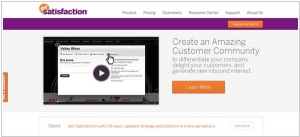
Sprinklr, a leading provider of Unified-CXM platform for all customer-facing functions, has recently made the decision to discontinue the well-known customer community and feedback service, GetSatisfaction. A decade ago, GetSatisfaction emerged as one of the most successful SaaS startups, offering paid service plans to renowned companies such as Method Products, Timbuk2, Twitter, and Digg. Over time, the platform attracted additional notable companies including Time Warner Cable, Verizon, Comcast, Mozilla, Mogo Money, Microsoft Hohm, AMC Theatres, Qantas, Apple Inc., Dell, and Facebook. However, it appears that the demand for such software among small businesses has decreased, with many either unwilling or unable to support customer communities. Simultaneously, larger companies have shifted towards more comprehensive CX platforms, leaving GetSatisfaction with a changing landscape. Notably, UserVoice, the main competitor of GetSatisfaction, has recently refocused its efforts on providing product feedback management software for growing SaaS companies.
2020. Salesforce announces new Service Cloud workforce planning tool
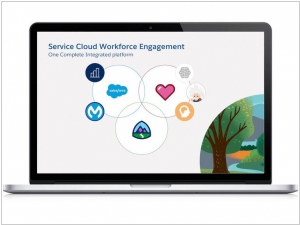
With a pandemic wreaking havoc in various parts of the globe, numerous companies are confronted with the challenge of managing dispersed customer service agents, leading to a complex workforce management situation. To address this issue, Salesforce is in the process of developing a new product called Service Cloud Workforce Engagement. Much like other Salesforce offerings, this solution comprises several crucial elements that work together to provide a comprehensive answer. Firstly, there is Service Forecast for Customer 360, a tool that utilizes AI to anticipate workforce requirements and intelligently allocate customer service requests. Furthermore, there is Omnichannel Capacity Planning, which aids managers in assigning customer service agents to channels like phone, messaging, or email based on the prevailing demand. Lastly, there is a training component designed to coach customer service agents on delivering accurate and appropriate responses tailored to specific situations.
2020. Salesforce applies AI to workflow with Einstein Automate
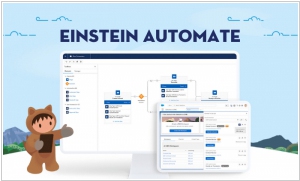
Salesforce has unveiled Einstein Automate, a new collection of workflow solutions powered by artificial intelligence (AI). Einstein serves as Salesforce's AI platform, encompassing all aspects of the company's product portfolio. It introduces automation to various tasks and simplifies the process of extracting valuable customer information, which often gets buried within vast amounts of data. Furthermore, Salesforce is incorporating MuleSoft, an integration company it acquired for $6.5 billion in 2018, into its offerings. This integration enables IT professionals to effortlessly build intricate connections between applications across the enterprise and the Salesforce suite of products, enhancing processes like mortgage approval workflows and more.
2020. Customer experience platform Sprinklr raises $200M
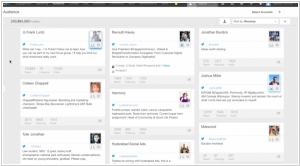
Sprinklr is in the process of raising $200 million with a valuation of $2.7 billion for its customer experience platform. The growth of customer experience management is comparable to the past growth of CRM. The company boasts a clientele of 1,000, with some clients spending millions of dollars annually. With 1,900 employees spread across 25 global offices, Sprinklr is well-positioned to lead the Customer Experience Management market, which is already substantial and expanding rapidly. Enterprises are increasingly recognizing the critical importance of incorporating CXM into their digital transformation strategy.
2020. Salesforce beefing up field service offering with AI
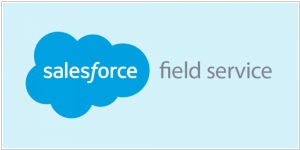
Salesforce is introducing AI-powered enhancements to its field service offerings, leveraging the capabilities of artificial intelligence. One of the key additions is Dynamic Priority, which allows the machine to set repair priorities based on factors such as service agreement type and criticality, streamlining call organization and enabling dispatchers to focus on other tasks. Furthermore, Salesforce aims to provide customers with a similar experience to tracking a driver's progress in a rideshare app. The introduction of Appointment Assistant, a new application, empowers customers to track the arrival time of their assigned repair person, ensuring they are aware of when to expect them.
2020. Salesforce announces a new mobile collaboration tool for sales called Anywhere
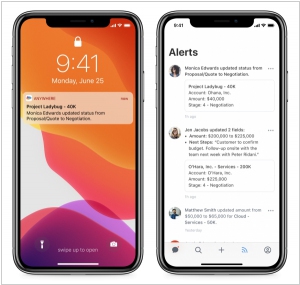
Salesforce has introduced a new tool called Salesforce Anywhere with the purpose of facilitating collaboration and data sharing among teams, regardless of their location. Recognizing the increasing significance of collaboration in a digital environment during the pandemic, the development of such an application became crucial for the company. The primary objective is to go beyond the confines of a traditional database and enable salespeople to access the most relevant information based on their sales pipelines. This tool allows employees to share information within their teams and engage in discussions related to that specific data. While there are other chat tools available, Salesforce Anywhere is specifically tailored for sharing Salesforce data, distinguishing it from more general-purpose platforms like Slack or other business chat tools.
2018. Salesforce allows to enter data to CRM via voice
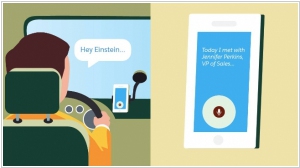
Sales managers are renowned for their verbal prowess, as talking is an integral part of their job. However, when it comes to entering customer data into a CRM system, they are faced with the arduous task of typing. Salesforce aims to alleviate this cognitive dissonance by introducing a new feature called Einstein Voice. This feature enables users to input data into the system effortlessly using natural speech. Just imagine, you hop into your car, open the mobile app, and have a conversation with a virtual assistant. You might say, "I just had a meeting with John Smith. He expressed interest in making a purchase but requested a follow-up call in a week...". The virtual assistant then dutifully adds a note to the customer's history in the CRM system. However, Salesforce might need to address the personality of their virtual assistant. It seems incongruous to task Einstein with such mundane responsibilities.
2018. Salesforce released new product - Customer 360
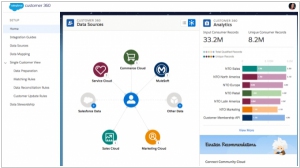
Customer 360 is an innovative software that integrates various customer data components to provide a more cohesive view within the Salesforce product family. Leveraging technology from Salesforce's Mulesoft acquisition, this solution aims to empower customer service representatives by equipping them with a comprehensive understanding of your interactions with the company. By eliminating the need for redundant information sharing, the representative can address your needs more effectively. The primary objective is to consolidate different product functionalities—such as sales, service, community, commerce, and marketing—into a unified customer view. Remarkably, this can be achieved without the need for coding, as highlighted by Salesforce.


